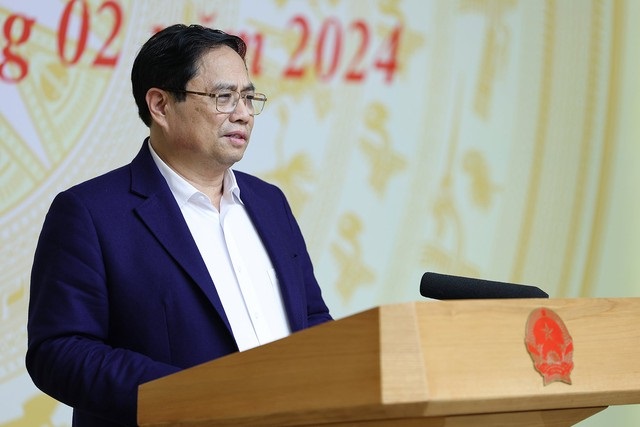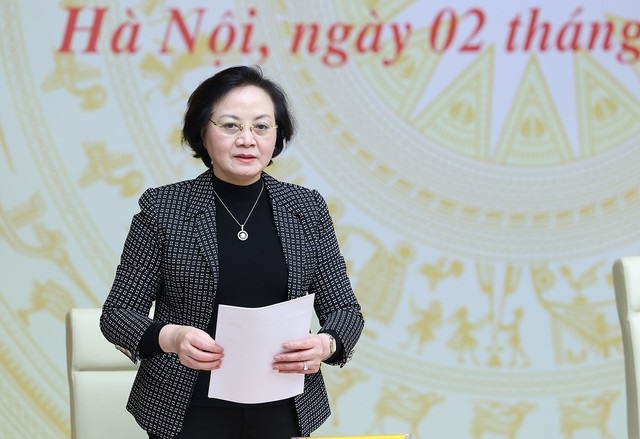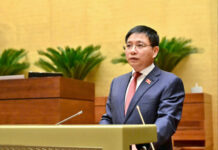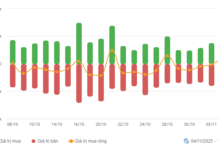
Prime Minister Pham Minh Chinh speaks at the 7th Meeting of the Government’s Administrative Reform Steering Committee – Photo: VGP/Nhat Bac
|
Many institutional, mechanistic, and policy barriers are being focused on dismantling at the meeting.
At the meeting, members of the Steering Committee; leaders of ministries, sectors, and localities discussed the results, limitations, and reasons for administrative reform in 2023; solutions to enhance administrative reform in 2024 in 6 areas: Institutional reform, administrative procedure reform, reform of the organization of state administrative agencies, reform of the public service regime, financial reform, and the construction and development of the e-government, digital government.
In institutional reform, the Government has organized 10 specialized sessions on legislation construction; ministries and sectors have advised and submitted to the Government 92 decrees and issued 372 circulars; provincial People’s Councils and People’s Committees have issued 3,427 legal normative documents.
In 2023, the Prime Minister established 26 Working Groups for administrative procedure reform (Working Groups) to direct and urge ministries, sectors, and localities to implement and directly remove difficulties and obstacles for localities; revamps the Steering Committee; organizes many national conferences on planning, foreign investment, financial market, real estate … Many institutional, mechanistic, and policy barriers have been focused on dismantling.
The Prime Minister approved a plan to cut, simplify 144 business regulations; ministries and sectors have implemented the reduction and simplification of 628 business regulations in 53 legal normative documents, bringing the total number of business regulations reduced and simplified from 2021 until now is 2,770 regulations; 14 ministries and sectors have implemented the plan to decentralize 86 administrative procedures, increasing the total number of decentralized administrative procedures from 2022 until now is 153/699 administrative procedures, reaching 21.9%.
In addition, 9 ministries and sectors have implemented a plan to simplify 147 administrative procedures, citizen-related documents regarding population management, reaching 49.26%. Up to now, 22/22 ministries and sectors have identified and publicized 1,372 internal administrative procedures; 63/63 localities have published a list of internal administrative procedures.
The implementation of the one-stop, one-stop mechanism in the settlement of administrative procedures is until the end of 2023; the digitization rate of the case files, the results of administrative procedures at ministries, and sectors achieved 28.59% and at the local level reached 39.48%; the rate of electronic documents with legal validity for reuse at ministries and sectors reached 28.6% and at the local level reached 45.3%. In 2023, the rate of administrative procedures settled correctly or ahead of schedule at ministries and sectors reached 30.60%, and at the local level, it reached 90.75%.
The reform of the organization of state administrative agencies has been promoted. It is expected that the results of the arrangement and reorganization of public non-business units under the management of ministries and sectors will have 895 public non-business units by the end of 2024, a decrease of 140 units compared to 2021; the autonomy of public non-business units reaches about 63%.
Localities have focused on organizing the review and organization of internal administrative organizations, reducing 13 departments and other administrative organizations under provincial People’s Committees; reducing 2,572 rooms and equivalent organizations under specialized agencies.
In terms of management and downsizing the payroll, implementing Government resolutions, from 2015 to December 15, 2023, the entire country reduced the payroll by 84,140 people. Of which, at the central level, there are 5,740 people, and at the local level, there are 78,400 people.
Public finance reform has been concerned about, thereby, state budget revenue exceeds about 8.12% of the estimate while exempting, reducing, delaying taxes, fees, charges, and land rent nearly VND 194,000 billion; at the same time increasing revenue, saving costs, about VND 560,000 billion has been reserved, ensuring enough resources for wage reform in the years 2024-2026…
However, the Steering Committee believes that in some fields, mechanisms, and policies are still lacking in consistency; administrative procedures still have obstacles affecting the investment environment, business, and the provision of public services to people and businesses; there is a situation where a number of officials and public servants evade, push, and lack responsibility; data connection, sharing from the information systems of ministries, sectors, and localities with the national databases is not smooth enough; the quality of some online public services for people and businesses is not high; the operation of One-stop units in many places is not in accordance with regulations…
In concluding remarks at the meeting, reviewing the outstanding results in administrative reform in the past time, Prime Minister Pham Minh Chinh emphasized that accelerating administrative reform, building a state administrative system that serves the people, professionalism, effectiveness is always determined by the Party and the State as a focus, a strategic breakthrough in building our socialist rule of law state.
In the past year, with the close attention, direct, and resolute direction of the political system, the Government, and the Prime Minister, along with the efforts and efforts of the members of the Steering Committee, levels, sectors, localities, the work of administrative reform has had very positive changes, comprehensive achievements.
The Prime Minister recognized 8 outstanding results. In which, many important documents, mechanisms, policies have been issued, contributing to removing bottlenecks and strongly promoting the process of administrative reform, such as: Civil Status Law, E-commerce Law (amended), Real Estate Business Law; some specific development policies have been passed, such as the specific development policy of Ho Chi Minh City, a pilot program of specific investment policy for construction of transportation works …
Ministries and sectors have reduced, simplified 628 business regulations; 100% of ministries, sectors, and localities have announced the list of internal administrative procedures; the quality of administrative procedure settlement has improved a lot; 100% of ministries and sectors have completed issuing documents defining functions, tasks, and powers; 100% of localities have completed the review and organization of internal organizations of departments …
It is noteworthy that new regulations on the quality assurance of public officials have been issued; on encouraging, protecting dynamic, creative, daring, responsible officials for the common interest; approving the National Strategy for Attracting and Distributing Human Resources; abandoning the promotion examination of civil servants…
Public financial reform has been addressed, thereby, state budget revenue exceeds about 8.12% of the estimate while exempting, reducing, delaying taxes, fees, charges, and land rent nearly VND 194,000 billion; at the same time increasing revenue, saving costs, about VND 560,000 billion has been reserved, ensuring enough resources for wage reform in the years 2024-2026…
The Prime Minister acknowledged and commended the efforts and contributions of the members of the Steering Committee, ministries, agencies, localities in administrative reform in 2023, in which some places have actively innovated in leadership, direction, have made breakthroughs in administrative reform, and have made important contributions to the general achievements of the country.
 Minister of Home Affairs Pham Thi Thanh Tra speaks – Photo: VGP/Nhat Bac
|
Administrative reform in all 6 fields
Specify the existing, limitations, and causes, as well as lessons learned in the process of implementing administrative reform, regarding the tasks for the coming period, Prime Minister Pham Minh Chinh emphasized that 2024 is a year of acceleration, breakthroughs, and has a particularly important significance in the successful implementation of the Economic-Social Development Plan for 2021-2025; in the context of intertwined opportunities and challenges, unpredictable developments, the effective implementation of administrative reform will play an important role, promote the successful implementation of set targets and tasks.
Emphasizing that investment in administrative reform is an investment in development; administrative reform must take the people and businesses as the center, subjects, objectives, motivations, resources; administrative reform is to create a new atmosphere, new motivation, new value, new success; the Prime Minister requested the organization of administrative reform in all 6 fields.
In which: Institutional reform must focus on removing legal obstacles to production and business. In administrative procedure reform, the focus must be on simplifying administrative procedures, strengthening decentralization and delegation; reducing compliance costs, input costs for people and businesses. The reform of the organization of state administrative agencies must focus on building a compact, effective, and efficient machinery; streamline the payroll but restructure and improve the quality of the civil servant corps. In the reform of the public service regime, the focus is on enhancing discipline and administrative discipline; building a culture of the office, ethics, responsibility of public servants.
In financial reform, the focus is on increasing revenue, reducing regular expenditure; restructuring towards increasing investment expenditure and reducing regular expenditure; combating negative corruption in financial implementation. In the construction and development of e-government, digital government, it is necessary to focus on building and developing e-government, digital government, digital citizens, digital society; promote the application of technology and promote activities on cyberspace; focus on implementing Project 06.
The Prime Minister requested each member of the Steering Committee, ministries, sectors, and localities to raise their determination to remove difficulties; promote the role and responsibility of leaders in directing, coordinating, thoroughly implementing the spirit of resolute action throughout the system of officials, civil servants, and public employees. Urgently organize the implementation of the assigned tasks to the administrative reform implementation units according to Resolutions No. 01/NQ-CP, No. 02/NQ-CP dated January 5, 2024, of the Government.
Ministries, sectors, and localities, urgently issue and effectively implement the Administrative Reform Plan for 2024, determine the focuses, and priorities; proactively issue according to authority and effectively implement encouragement mechanisms, rewards, priority proposals for appointment and appointment of officials with outstanding capabilities, proposing many ideas, administrative reform initiatives.
Especially, prioritize resources for law construction, raising the effectiveness and efficiency of the organization of law enforcement; focus on dismantling mechanisms, policies, to support the production and business activities and the lives of the people, businesses; continue to improve the overall legal framework to promote the development of science, technology, and innovation.
Review, propose abolition, and reduction of business conditions, certificates, specialized inspection of goods
The head of the Government instructed ministries, sectors, and localities to organize the deployment, focus on implementation, complete with quality and timeliness the assigned tasks in the Plan for administrative procedure reform in 2024 approved in Decision No. 104/QD-TTg dated January 25, 2024; proactively study, review, propose to remove from the investment business field list of conditions for investment and business conditions for industries that can be applied with more effective management measures.
In addition, review, propose to abolish unnecessary, unfeasible, unclear, difficult-to-determine, and impractical business conditions; abandon unnecessary certification types, simplify duplicate certification types in content; continue to review and reduce the list of import and export goods subject to management, specialized inspection of goods with low risk or no risk.
The Prime Minister also directed to strengthen the review, issuance of regulations to complete the construction of the position of work of officials, civil servants, public employees in the state administrative system completed before March 31, 2024; continue to effectively implement the National Strategy for Attracting and Distributing Human Resources and the regulations on the quality assurance of public officials, regulations on encouraging, protecting officials who dare to think, dare to do…
In addition, continue to implement measures to improve discipline, administrative discipline, the quality of service performance, and improve the quality of service to people and businesses; strictly handle violations of discipline, administrative discipline, ensure the seriousness of law enforcement, and consolidate people’s trust.
Especially, complete, build a lean, effective, and efficient machinery; implement the arrangement of the internal organization in connection with the downsizing and improving the quality and efficiency of the operation of each agency, unit. In which, complete the arrangement of district-level administrative units and commune-level units in the third quarter of 2024.
Ministries, sectors, localities must continue to strengthen delegation and decentralization associated with the allocation of appropriate resources, and strengthen inspection, supervision, control of power; focus on developing digital infrastructure, improving the national database, specialized databases, enhancing data connection, sharing between agencies to improve the effectiveness and efficiency of state management and the quality of public service provision to people and businesses.
In February 2024, the Steering Committee will issue the 2024 Operation Plan of the Steering Committee, Prime Minister Pham Minh Chinh requested the members of the Steering Committee to immediately implement the tasks, solutions to accelerate administrative reform, especially administrative procedure reform associated with digital transformation, providing online public services, contributing to promoting the successful implementation of economic-social development objectives and tasks in 2024 and the coming time.





































